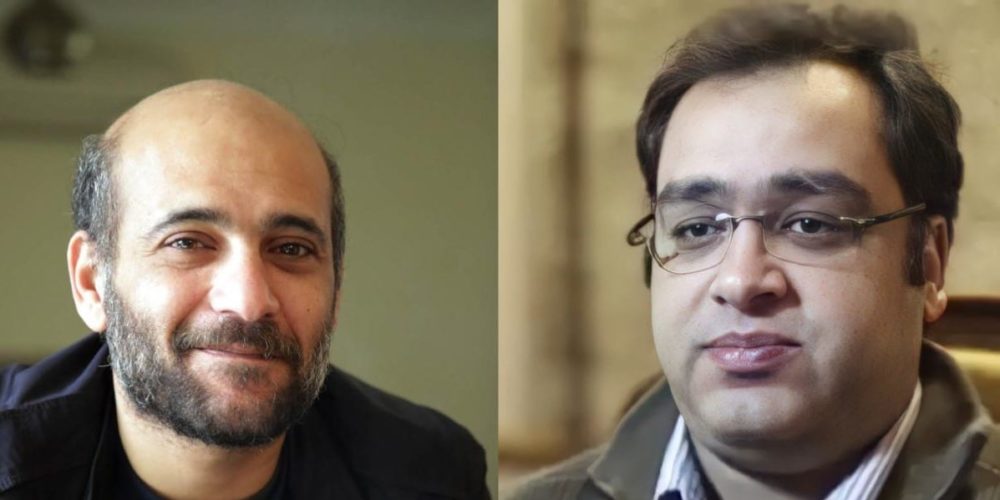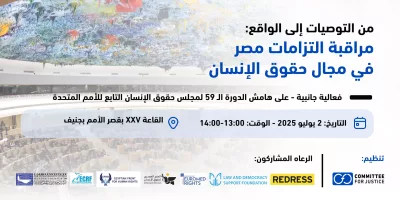Yesterday July 14, the Court of Cassation rejected the appeals of human rights defenders Zyad Elelaimy, Ramy Shaath, and eleven others regarding their inclusion on the ‘Terrorist List’ for a period of five years, an appalling miscarriage of justice denounced by the signatory human rights organizations as further confirmation of the judiciary’s politicized role as an enactor of reprisals against Egyptian president Abdel Fattah al-Sisi’s rivals. The government’s terrorist listing of Elelaimy and Shaath is part of the Egyptian government’s systematic alienation and defamation of peaceful opponents and critics, in which anyone who publicly questions or challenges the state’s authoritarian practices is liable to be charged with ‘terrorism.’ The undersigned call for the removal of all human rights defenders and political activists from the Terrorist List, and for the immediate release of all detainees in the Hope Coalition Case, under which Zyad Elelaimy and Ramy Shaath are being prosecuted and unlawfully detained in excess of the two-year maximum period permitted by Egyptian law for pretrial detention.
The current prosecution of Zyad Elelaimy and Ramy Shaath has its official beginnings in mid-2019, with a state security campaign initiated by a police raid at daybreak on the homes of a number of political activists, journalists, human rights defenders, and businesspersons, who were subsequently arrested and charged under Case 930 of 2019 (the Hope Coalition Case). The case is widely seen as politically-motivated retaliation for these persons’ initiative to form a civil, secular alliance to run in the parliamentary elections of November 2019. Since then, the Egyptian government has escalated its quest to eliminate any genuine political opposition, targeting peaceful opponents and activists with a wide array of repressive tactics including arbitrary arrest, pretrial detention prolonged beyond two years in violation of Egyptian law – often through the illegitimate practice of ‘recycling cases’, and terrorism charges – all of which have been used in reprisal against Elelaimy and Shaath, who are well known within Egypt and internationally for their peaceful activism.
Already behind bars as defendants in the Hope Coalition Case, Zyad Elelaimy and Ramy Shaath were added to the Terrorist List in April 2020 as part of investigations in another case, no. 571 of 2020. The Cairo Criminal Court approved the Public Prosecution’s request to include Elelaimy, Shaath, lawyer Mohammed Abu Hureira, and ten others on the Terrorist List, even though neither the defendants nor their lawyers were ever summoned before any judicial entity in line with their fundamental due process rights. The defense lawyers were also barred from viewing the Public Prosecution’s memorandum requesting the terrorist listing in a session at the Court of Cassation on 10 February 2021, and the Prosecution did not hear any statements from the defendants on the terrorism accusions against them until yesterday’s 14 July appeal hearing.
The ramifications of the terrorist listing for Zyad Elelaimy and Ramy Shaath include the imposition of a travel ban, the seizure of their assets, the potential revocation of citizenship (Shaath, a dual citizen, has had his Egyptian passport confiscated) and the revocation of membership to any political party or professional association. Furthermore, even if Elelaimy and Shaath were to be released in connection to their prosecution under the Hope Coalition Case, their inclusion on the Terrorist List would ensure that any such freedom is illusory, as they would neither be allowed to leave the country nor access their assets, while constantly at risk of being imprisoned again. This situation is an exemplification of the ‘recycling cases’ practice, in which multiple cases with similar or ‘recycled’ charges are brought against defendants in rapid and sometimes overlapping succession with the intention of keeping them indefinitely entangled in Egypt’s judicial system.
The judiciary’s collusion with Egyptian president Sisi in his targeting of peaceful political activists and human rights defenders – especially under the banner of counterterrorism – has been solidified under authoritarian legislation increasingly enacted under Sisi’s administration. The role of the Court of Cassation as an executor of Sisi’s political vendettas was cemented by passage of Law no. 77 of 2019, which allows the President of the Egypt to appoint the heads of judicial institutions, guaranteeing himself full control over the highest echelons of the judiciary. The Court of Cassation’s verdict is reliant upon laws containing overly broad terms in defining terrorism and terrorist entities. Law no. 94 of 2015, commonly known as Anti-Terrorism Law, defines the crime of financing terrorism in its recently amended Article 3 as “Financing an organized individual or collective terrorist activity, at home and abroad…whether the terrorist act took place or not.”
Such nebulous legislation opens the door for the judiciary to impose penalties simply for the existence of security investigations alleging a person’s intent to commit a terrorist crime without substantiating its occurrence or commission. This prompted United Nations experts to call on the Egyptian government to remove Ramy Shaath and Zyad Elelaimy from the Terrorist List and to end its pervasive misuse of counter-terrorism legislation to retaliate against political activists and human rights defenders.
Signatory organizations:
- Cairo Institute for Human Rights Studies
- The Egyptian Front for Human Rights
- The Arab Network for Human Rights Information
- Committee for Justice
- Freedom Initiative
- Egyptian Initiative for Personal Rights
- Nadeem Center
- Association for Freedom of Thought and Expression






